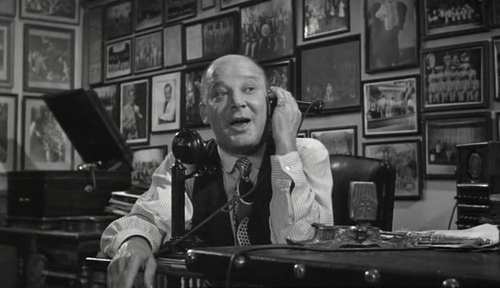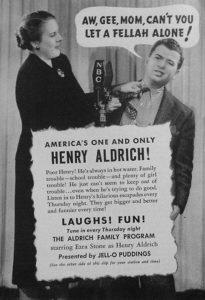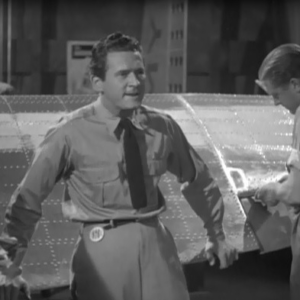Want to know where more of these pet phrases from cartoons originated? This week’s Radio Round-Up reveals the origin of radio catchphrases from various programs used in animated cartoons from the Golden Age…
Stand-up comedian Billy Gray (1904-1978) was an emcee of The Band Box, a popular comedy club in Los Angeles when Lou Costello purchased the establishment, circa 1942. Besides playing “The Baby” on Eddie Cantor’s radio program, Gray appeared on The Abbott and Costello Show as a different child character, Little Matilda. On the program, Matilda would interrupt and reveal her age, as she stated: “I’m only three-and a half years old…” He also toured with Abbott and Costello in appearances at military base during World War II.

Billy Gray seen in SOME LIKE IT HOT (1959)
Gray took over the ownership of the Band Box, which later booked comedians such as Phil Silvers, Jackie Gleason, Dean Martin & Jerry Lewis, Buddy Hackett, and Don Rickles in early performances before the club closed in 1967. Here’s an excerpt of the November 18, 1943 broadcast of The Abbott and Costello Show, with the select number of Warners cartoons that referenced Matilda’s catchphrase. Unfortunately, for the video, I am unable to find a photograph of Billy Gray from the 1940s, so the comedy duo themselves are used as a substitute.
Clips used (all Warners): Russian Rhapsody (1944), Falling Hare (1943), Trap Happy Porky (1945), Wagon Heels (1945), Baby Bottleneck (1946), Baseball Bugs (1946), One Meat Brawl (1947)
 Every week in the opening introduction, The Aldrich Family would begin with Alice Aldrich calling out to her teenage son, “Henry-y-y-y-y! Henry Al-drich!” He would then respond, “Coming, Mother!”
Every week in the opening introduction, The Aldrich Family would begin with Alice Aldrich calling out to her teenage son, “Henry-y-y-y-y! Henry Al-drich!” He would then respond, “Coming, Mother!”
The character of Henry Aldrich originated from a Broadway play by Clifford Goldsmith entitled What a Life, which debuted on April 13, 1938 and ran for 538 performances before it ended on July 8, 1939. The play was adapted into comedy sketches for Rudy Vallee’s radio program and The Kate Smith Hour before the Aldrich family material from both shows led to their own series in 1939. The Aldriches appeared in several B-movies from Paramount Pictures in the early 1940s, and a television show based on the family aired from 1949 to 1953, the year the radio program ended.
Presented here is a standard introduction of The Aldrich Family radio show, along with several clips from animated cartoons that lifted the famous opener. Kent Rogers provided the crackling adolescent tones for “Coming, Mother!” in each of the 1941 releases—you can see Rogers on-screen using the same reference in the Hal Roach “streamliner” feature All-American Co-Ed, released the same year (at 7:12).
Clips used: Farm Frolics (WB/1941), Hollywood Steps Out (WB/1941), The Barber of Seville (Lantz/1944), The Home Front (WB, Snafu/1943), Goofy Groceries (WB/1941), Book Revue (WB/1946)
As mentioned in an earlier installment of Radio Round-Up, radio actor Wally Maher played the nasally-voiced Wilbur on Tommy Riggs and Betty Lou. Tex Avery’s short-lived character Screwy Squirrel was patterned after Wilbur, from his deep sniff after a greeting and his grating cackle. Maher uttered a phrase lifted from the Tommy Riggs and Betty Lou program in at least two Screwy Squirrel entries, which also shows up in several Warners cartoons, particularly in Bob Clampett’s films: “I like him, he’s silly!”
Episodes of Tommy Riggs and Betty Lou are exceedingly rare besides the broadcast shared in the previous column mentioning the show. However, Maher appeared as Wilbur in guest appearances on The Jack Benny Program and The Burns and Allen Show, which are more commonly in circulation. (Maher occasionally appeared on Benny’s show, playing different characters in his normal voice.) Here is a guest appearance from Jack Benny’s show, which aired on October 22, 1944, along with different animated cartoons that used Wilbur’s signature line. By the time of Wilbur’s guest appearance in this broadcast, the last cartoon featuring Screwy Squirrel, Lonesome Lenny, entered its early production stages.
Clips used: Nasty Quacks (WB/1945), The Screwy Truant (MGM/1945), Falling Hare (WB/1943), Birdy and the Beast (WB/1944) Happy-Go-Nutty (MGM/1944)
Community Sing, sponsored by Gillette razor blades, was a short-lived comedy/variety series, which aired on CBS from September 6, 1936 to August 29, 1937. Milton Berle hosted the program, in an early stage of his radio career, and among its players in comedic sketches were vaudeville comic Tommy Mack (1898-1982) as Judge Hugo Straight and Bert Gordon as Mischa Moody. During its brief run, Mack’s and Gordon’s characters participated in an RKO film titled New Faces of 1937, which featured other radio personalities such as Joe Penner and Harry Einstein’s “Parkykarkus” character. The program also proved influential to Warner Bros. cartoons, with Frank Tashlin’s The Woods Are Full of Cuckoos (1937)—arguably, one of the most dated of the entire studio’s output— serving as a parody of the program.

ABOVE: Bert Gordon (right), Tommy Mack (left)
On the program, Judge Hugo Straight would become flustered and volatile in the middle of a tirade. The receiving end of his fury would attempt to calm him down, as they said, “Now, don’t get excited,” to which Hugo would burst out in anger: “EXCITED?! Who’s excited?! I’m not excited!” This line would be used in a small number of Warner Bros. cartoons released in 1937. A year later, Mack’s character was spoofed as a gnome judge (voiced by Danny Webb) in the commercial film Boy Meets Dog (1938), produced by Walter Lantz. Like Tommy Riggs, episodes of Community Sing are scarce, so here is an excerpt from an April 21, 1937 broadcast along with the references to Tommy Mack’s outburst.
Clips used (all Warners): Porky and Gabby, Uncle Tom’s Bungalow, Porky’s Romance (all 1937).
There will be more miscellaneous catchphrases when you tune in next week!
EDITOR’S NOTE: This blog is a labor of love. None of our regular contributors are paid. All the ads you see at the top and in the right sidebar are provided gratis to companies and friends of the site, who have contributed in numerous non-monetary ways to keeping the Cartoon Research site alive.
Devon Baxter is one of our youngest and most diligent contributors. His weekly Breakdowns and Round-ups are some of the most important pieces of original research we post here each week. In a relatively short time he’s earned the respect of the entire animation history community – and I can’t thank him enough.
Devon could use a little financial help at this time. In the old days, websites used to have ‘tip jars’ – if you like what you see here, it wouldn’t be uncommon to ask you throw in a few bucks – or even one dollar – to help the cause; and now to thank Devon for his Herculean efforts on these posts. I’ve sent him a contribution – but it’s far from what he deserves. Please consider chipping in – no amount is too small. Click Here for Details.
– Jerry Beck



 DEVON BAXTER is a film restoration artist, video editor, and animation researcher/writer currently residing in Pennsylvania. He also hosts a
DEVON BAXTER is a film restoration artist, video editor, and animation researcher/writer currently residing in Pennsylvania. He also hosts a 



















































































Check out these books:
The Top 100 Classic Radio Shows by Portable Press (Uncle John’s Bathroom Reader series)
The Great American Broadcast by Leonard Maltin
On The Air by John Dunning
Don’t forget The Big Broaedcast, by Frank “Hal Seeger’s Batfink” Buxton * Bill Owen!
Devon’s contributions are always a very welcome read, and it’s a shame to hear of his current struggles. Anyone who writes a blog or finds themselves down research rabbit-holes knows how time consuming it all can be (since having kids I’ve virtually abandoned my blog), but this type of research is vital to keep information and interest alive among new generations of film fans.
I’ve chipped in so he can keep himself on track and keep up the good work – all the best to you Devon, and to you Jerry for making us aware!
OH, my God! The Catchphrase posts are THE absolute best. Keep ’em coming, pleeez!!!
Very good post! Interestingly, Yowp (Tralfaz) also has a Bert Gordon piece posted today.
Click here: https://tralfaz.blogspot.com/2018/02/the-mad-russian.html
Ezra Stone, the original Henry Aldrich, briefly left the show for the military during WW2; his pinch-hitters included Dickie Jones (voice of Disney’s Pinocchio) and Norman Tokar (who later directed several Disney live-action films).
Wally Maher was a very busy radio actor, usually playing tough guys, crooks, or cops (in the last category: Lt. Riley in “Let George Do It,” and Sgt. Matt Greb on “The Lineup”) until his passing in 1951.
Maher did Scwewy Sqwirrell hisself!
It sounds like the Petunia line is the same recording as Gabby Goat’s, just not sped up.
If there is some interest, I happen to have one of the songbooks for the Gillette show; some of the pages in it go a long way toward explaining the characters and some of the gags in “The Woods Are Full of Cuckoos.”
In the clip of “Goofy Groceries”, you can hear a bit of a doomy piece of music – I call it the Escaped Gorilla Theme – that showed up in various Warner cartoons.
https://clyp.it/vyjlqdf5
I wonder if anyone knows if this was a Carl Stalling original, or from somewhere else?
I can help with this one.
The actual name of that musical cue is Fasolt and Fafner from “Das Rheingold” Music by Richard Wagner
It’s Carl Stalling’s take on the prelude to what’s more properly known as Das Rheingold, Scene II: “Sanft schloss Schlaf dein Aug'”
https://www.youtube.com/watch?v=ni9QLl2aW_Y
Now hopefully you’ll go to your post and change the name from escaped Gorilla to Fasolt and Fafner. 🙂
Cheers!
Thank you, I shall Gorilla no more.
I seem to recall a Heckle & Jeckle cartoon in which they meet a kid who kept exclaiming “I’m only 3 1/2 years old!” To which Heckle replied: “You’ll never make it to 4 if ya keep this up!”
Tommy Riggs had the same gimmick as Billy Gray: playing a little-girl character. “Betty Lou” sounded more convincing than “Matilda”: listeners who believed that Betty Lou was real would send toys, dolls, and other gifts, which Riggs would forward to charities and orphanages.
There is another catch phase that I’ve heard on several cartoons: Some hick is dancing with a girl and he says, “Look fellows, I’m dancin’ … I’m dancin’!!”
Does anyone know where that originated?
Wasn’t that Huntz Hall from the Bowery Boys and East Side Kids comedy features who did that line?
Hey, Devon, I sent a little funding to you, not much I’m afraid, but I hope it helps even the slightest.
Love these posts a whole lot since these, among other such dated gags, are partly reasons why we enjoy these cartoons as time capsules.
On another subject, there are so many bits of scoring heard in cartoons that are memorable to us all specifically because we have heard them in cartoons, and these are *NOT* bits of scoring that one could easily pinpoint as popular tune or recognizeable classical piece. I wonder how many such bits of scoring were actually devised by the people involved in creating such scores for cartoons or live action comedy shorts–oh, do I wish that original scores could be found for the Hal Roach talkies. I know that there have been bands across the world that have neatly replicated such scores, but when I listen to the actual scores, there are bits of instrumentation that add that punch to the piece that no one has so neatly replicated, even if they were seen as mistakes or off-beats.
Jerry, let me also thank you for letting us know about Devon’s difficulties. I was glad to be able to help in my small way just based on how much I valued today’s blog contributions by him.
Another HENNRRRY! reference
https://m.youtube.com/watch?v=PLLqGbPvXSM
I was thinking of that reference as well.
Jerry, if it isn’t too much trouble do you think you could make that editor’s note “sticky” on the side of the blog somewhere? I think it would also be helpful if we could see how far away from his $3000 goal Devon is.
Is the phrase “Are you followin’ me?”, as heard in THE HEP CAT and THE EARLY BIRD DOOD IT, a reference to anything in particular?